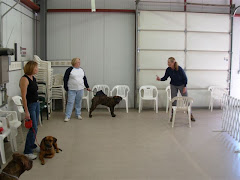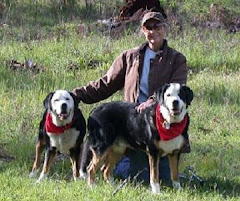Last week I wrote about submissive urination, which shouldn't be considered a housebreaking problem. This week, however, we're getting a little closer to the subject....
Lou Ann adopted a neutered male pit bull from the local shelter and brought him home. He was four years old and had previously lived with a young military couple who could no longer keep him because they both got orders to Iraq.
The dog was a house pet and was supposed to be completely housebroken. Yet, as soon as Lou Ann got the dog inside her condo, the dog ran into her bedroom and pooped on the carpet. Within an hour, Lou Ann also found a wet spot in a corner near an end table where the dog had presumably hiked his leg. She was livid. She called the adoption agency right away to complain that the dog had been misrepresented. All the agency people could tell her was that she should bring the dog back if she couldn't live with the situation.
The next call Lou Ann made was to me. "This dog was supposed to be housebroken!" she wailed. "He's such a neat dog, but I can't keep him if he's going to be messing all over the house!"
Through explaining the situation to her, I guess I talked her out of returning him to the shelter. As far as I know, everything worked out. Unfortunately, Lou Ann's predicament is not uncommon. If you've every been disillusioned by a dog you thought was housebroken, here are some things you need to remember:
1. Dogs aren't human. They don't use a toilet, they don't flush and they don't wash their paws. They can be pattern-trained to eliminate outside. But, unlike a human who will avoid "messing" at just about any cost, the canine brain simply isn't that advanced and foolproof. Accidents will happen if conditions are "right."
2. Just because a dog is "housebroken" in his own home doesn't mean he will transfer that training over to someone else's home. A dog's behavior must be generalized--that is, he must practice the desired behaviors in various locations before he's really learned it.
3. When a dog is dropped into a new household, he's confused and stressed about who's in charge, what the rules are, etc. This stress is enough to make him forget himself and create a mess. Animals eliminate more frequently when they're stressed. We do, too. The only difference is that we hold it till we get to a bathroom. They don't.
4. If there are other dogs or animals in the household, the new dog will be even more confused and stressed. Some of the elimination will be a marking behavior.
The easiest way to ease a new dog into your household, whether he's a new adoptee or a visiting relative, is to put a "drag leash" on him and keep him within sight at all times in the new home. Show him where to potty outside, and immediately start practicing some simple obedience commands with him throughout the new house, so he knows this is a special place that he shouldn't soil.
Give the new dog--and yourself--a break for the first few days as he learns the ropes. Anticipating accidents is the biggest key to eliminating them.
Next week: "Leaky Females"


















No comments:
Post a Comment